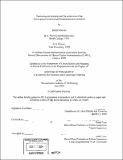Technological learning and the evolution of the Indian pharmaceutical and biopharmaceutical sectors
Author(s)
Srinivas, Smita
DownloadFull printable version (17.95Mb)
Other Contributors
Massachusetts Institute of Technology. Dept. of Urban Studies and Planning.
Advisor
Frank Levy.
Terms of use
Metadata
Show full item recordAbstract
The Indian pharmaceutical and biopharmaceutical sectors have been characterised by three features considered analogous to technological stagnation: low R&D investments, "copying" on-patent drugs (legal in India if a novel process is found) and manufacturing off-patent, generic drugs. Yet, some firms are innovating in drug discovery and development and the total number of firms is among the most numerous and export-oriented in the developing world. This dissertation looks at patterns of technological capabilities using sector-wide indicators and firm-level cases in synthetic and biological pharmaceuticals. Common explanations for the sectoral capabilities are the country's process patent regime. However, a more detailed analysis shows this cannot be the sole cause. Although the patent regime was critical in helping firms develop skills early on, their process capabilities were honed by a variety of selection environments, of which the patent regime was one type. There were at least three distinct selection environments and at least three broad types of associated learning. The findings of external environmental influence and selection do not weaken the importance of national policy, far from it. However, studies that assign explanatory power for the sectors' advance entirely to national patent policies or rational firms miss the significance of the Indian story to date. The research also shows that there is scope for broadening debates on public health medicines to address technological learning opportunities in developing countries.
Description
Thesis (Ph. D.)--Massachusetts Institute of Technology, Dept. of Urban Studies and Planning, 2004. Includes bibliographical references (p. 216-227).
Date issued
2004Department
Massachusetts Institute of Technology. Department of Urban Studies and PlanningPublisher
Massachusetts Institute of Technology
Keywords
Urban Studies and Planning.